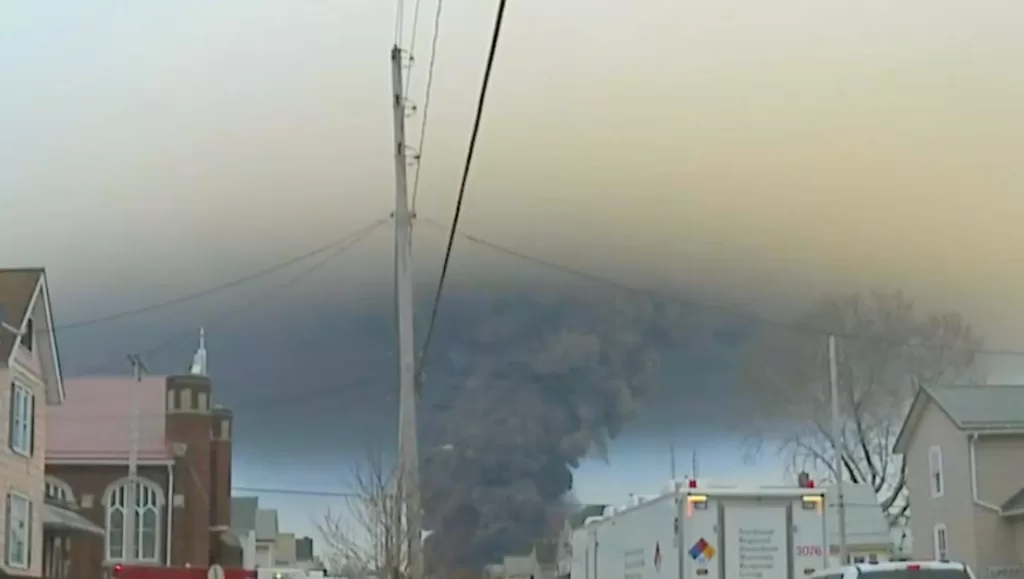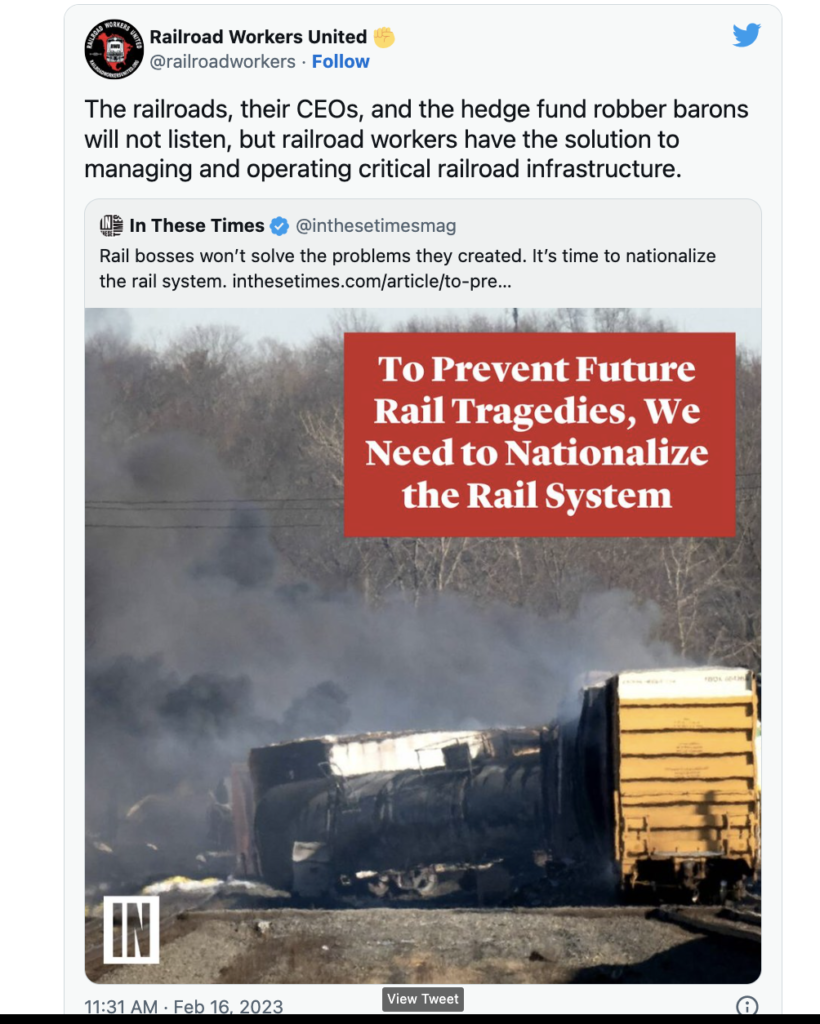
Editor’s Note: This article by Common Dreams staff writer Jake Johnson originally appeared in Common Dreams at https://www.commondreams.org/news/rail-worker-alliance-nationalization
The railroads, their CEOs, and the hedge fund robber barons will not listen, but railroad workers have the solution to managing and operating critical railroad infrastructure.
An alliance representing rail workers across the United States published an open letter late Thursday urging all of organized labor to support the nationalization of the country’s railroad system, arguing that the private and inadequately regulated industry has “shown itself incapable of doing the job.”
“In face of the degeneration of the rail system in the last decade, and after more than a decade of discussion and debate on the question, Railroad Workers United (RWU) has taken a position in support of public ownership of the rail system in the United States,” reads the letter, which was published as the small town of East Palestine, Ohio is attempting to recover from the toxic derailment of a Norfolk Southern train two weeks ago.
“We ask you to consider doing the same, and announce your organization’s support for rail public ownership,” continues the letter, which was addressed to unions as well as environmental, transportation justice, and workers’ rights organizations. “While the rail industry has been incapable of expansion in the last generation and has become more and more fixated on the operating ratio to the detriment of all other metrics of success, precision scheduled railroading (PSR) has escalated this irresponsible trajectory to the detriment of shippers, passengers, commuters, trackside communities, and workers.”
PSR is a Wall Street-backed model that has taken hold across the U.S. rail industry, gutting workforces and undermining safety in pursuit of more “efficiency” and larger profits for rail carriers and rich investors. Meanwhile, more than 1,000 of the nation’s trains derail every year.

In its open letter, RWU—whose ranks include workers from a number of different unions and rail professions—noted that “on-time performance is suffering” and “shipper complaints are at all-time highs” as rail carriers prioritize their profit margins over all else.
Norfolk Southern, which also owns the train that derailed outside of Detroit on Thursday, brought in record revenue and profits in 2022.
“Passenger trains are chronically late, commuter services are threatened, and the rail industry is hostile to practically any passenger train expansion,” RWU’s letter states. The workforce has been decimated, as jobs have been eliminated, consolidated, and contracted out, ushering in a new previously unheard-of era where workers can neither be recruited nor retained. Locomotive, rail car, and infrastructure maintenance have been cut back. Health and safety have been put at risk. Morale is at an all-time low.”
The alliance also pointed to the White House-brokered contract that Congress forced rail workers to accept last year as evidence of broader industry dysfunction. At the center of the contract negotiations—which nearly resulted in a nationwide strike—was the issue of paid sick leave, which is denied to most rail workers due to PSR.
The solution, RWU contended, is to nationalize the rail industry, a step that would open the door to “a new fresh beginning for a vibrant and expanding, innovative, and creative national rail industry to properly handle the nation’s freight and passengers.” The organization is calling on allies to back its resolution supporting public ownership.
“During WWI, the railroads in the U.S. were in fact temporarily placed under public ownership and control,” the open letter notes. “All rail workers of all crafts and unions supported (unsuccessfully) keeping them in public hands once the war ended, and voted overwhelmingly to keep them in public hands. Perhaps it is time once again to put an end to the profiteering, pillaging, and irresponsibility of the Class 1 carriers.”
The derailment and chemical spill in East Palestine have catalyzed discussions on how to prevent similar disasters from occurring in the future. Some, including environmental groups and progressive lawmakers, have implored the U.S. Transportation Department to take urgent measures to improve rail safety, including modernizing critical braking systems.
But others have sided with RWU in arguing that while narrow reforms may be necessary as near-term solutions, they ultimately won’t be enough to solve the rail industry’s deep flaws, which stem from the prioritization of ever-greater returns.
“We demand that Congress immediately begin a process of bringing our nation’s railroads under public ownership,” the general executive board of the United Electrical, Radio, and Machine Workers of America (UE) declared in a statement late last month, just days before the fiery crash in eastern Ohio.
“Railroads are, like utilities, ‘natural monopolies,'” UE said. “The consolidation of the Class 1 railroads in the U.S. into five massive companies over the past several decades has made it clear that there is no ‘free market’ in rail transportation.”
“Our nation can no longer afford private ownership of the railroads; the general welfare demands that they be brought under public ownership,” the union added.
Read RWU’s full open letter:
Dear Friends and Fellow Workers:
In face of the degeneration of the rail system in the last decade, and after more than a decade of discussion and debate on the question, Railroad Workers United (RWU) has taken a position in support of public ownership of the rail system in the United
States. (see Resolution attached). We ask you to consider doing the same, and announce your organization’s support for rail public ownership.
While the rail industry has been incapable of expansion in the last generation and has become more and more fixated on the Operating Ratio to the detriment of all other metrics of success, Precision Scheduled Railroading (PSR) has escalated this irresponsible trajectory to the detriment of shippers, passengers, commuters, trackside communities, and workers. On-time performance is suffering, and shipper complaints are at all-time highs. Passenger trains are chronically late, commuter services are threatened, and the rail industry is hostile to practically any passenger train expansion. The workforce has been decimated, as jobs have been eliminated, consolidated, and contracted out, ushering in a new previously unheard-of era where workers can neither be recruited nor retained. Locomotive, rail car, and infrastructure maintenance have been cut back. Health and safety have been put at risk. Morale is at an all-time low. The debacle in national contract bargaining last Fall saw the carriers ±after decades of record profits and record low Operating Ratios—refusing to make even the slightest concessions to the workers who have made them their riches.
Since the North American private rail industry has shown itself incapable of doing the job, it is time for this invaluable transportation infrastructure—like the other transport modes—to be brought under public ownership. During WWI, the railroads in the U.S. were in fact temporarily placed under public ownership and control. All rail workers of all crafts and unions supported (unsuccessfully) keeping them in public hands once the war ended, and voted overwhelmingly to keep them in public hands. Perhaps it is time once again to put an end to the profiteering, pillaging, and irresponsibility of the Class 1 carriers. Railroad workers are in a historic position to take the lead and push for a new fresh beginning for a vibrant and expanding, innovative, and creative national rail industry to properly handle the nation’s freight and passengers.
Please join us in this historic endeavor. See the adjoining RWU Resolution in Support of Public Ownership of the Railroads, along with a sample Statement from the United Electrical (UE). If your organization would like to take a stand for public ownership of the nation’s rail system, please fill out the attached form and email it in to RWU. We will add your organization to the list. Finally, please forward this letter to others who may be interested in doing the same. Thank you!
In solidarity,
The RWU Committee on Public Ownership
Common Dream’s work is licensed under Creative Commons (CC BY-NC-ND 3.0). Feel free to republish and share widely.
Jake Johnson is a senior editor and staff writer for Common Dreams.
@johnsonjakep •jake@commondreams.org
